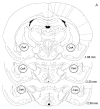Stimulation of α2-adrenergic receptors in the central nucleus of the amygdala attenuates stress-induced reinstatement of nicotine seeking in rats
- PMID: 20854830
- PMCID: PMC3014445
- DOI: 10.1016/j.neuropharm.2010.09.013
Stimulation of α2-adrenergic receptors in the central nucleus of the amygdala attenuates stress-induced reinstatement of nicotine seeking in rats
Abstract
Tobacco addiction is a chronic disorder that is characterized by craving for tobacco products, withdrawal upon smoking cessation, and relapse after periods of abstinence. Previous studies demonstrated that systemic administration of α2-adrenergic receptor agonists attenuates stress-induced reinstatement of drug seeking in rats. The aim of the present experiments was to investigate the role of noradrenergic transmission in the central nucleus of amygdala (CeA) in stress-induced reinstatement of nicotine seeking. Rats self-administered nicotine for 14-16 days and then nicotine seeking was extinguished by substituting saline for nicotine. The effect of the intra-CeA infusion of the α2-adrenergic receptor agonists clonidine and dexmedetomidine, the nonselective β1/β2-adrenergic receptor antagonist propranolol, and the α1-adrenergic receptor antagonist prazosin on stress-induced reinstatement of nicotine seeking was investigated. In all the experiments, exposure to footshocks reinstated extinguished nicotine seeking. The administration of clonidine or dexmedetomidine into the CeA attenuated stress-induced reinstatement of nicotine seeking. The administration of propranolol or prazosin into the CeA did not affect stress-induced reinstatement of nicotine seeking. Furthermore, intra-CeA administration of clonidine or dexmedetomidine did not affect operant responding for food pellets. This suggests that the effects of clonidine and dexmedetomidine on stress-induced reinstatement of nicotine seeking were not mediated by motor impairments or sedation. Taken together, these findings indicate that stimulation of α2-adrenergic receptors, but not blockade of α1 or β-adrenergic receptors, in the CeA attenuates stress-induced reinstatement of nicotine seeking. These findings suggest that α2-adrenergic receptor agonists may at least partly attenuate stress-induced reinstatement of nicotine seeking by stimulating α2-adrenergic receptors in the CeA.
Copyright © 2010 Elsevier Ltd. All rights reserved.
Figures












References
-
- Ahmed SH, Koob GF. Cocaine- but not food-seeking behavior is reinstated by stress after extinction. Psychopharmacology (Berl) 1997;132:289–295. - PubMed
-
- Alheid GF. Extended amygdala and basal forebrain. Ann N Y Acad Sci. 2003;985:185–205. - PubMed
-
- American Psychiatric Association. Diagnostic and Statistical Manual of Mental Disorders. American Psychiatric Press; Washington, DC: 2000.
-
- Bardo MT, Bevins RA. Conditioned place preference: what does it add to our preclinical understanding of drug reward? Psychopharmacology (Berl) 2000;153:31–43. - PubMed
-
- Bardo MT, Green TA, Crooks PA, Dwoskin LP. Nornicotine is self-administered intravenously by rats. Psychopharmacology (Berl) 1999;146:290–296. - PubMed
Publication types
MeSH terms
Substances
Grants and funding
LinkOut - more resources
Full Text Sources
Medical

